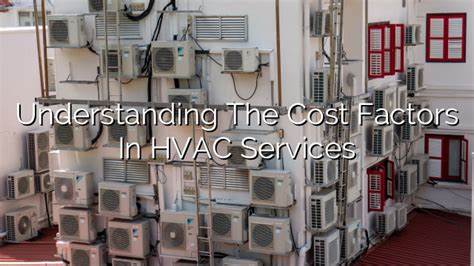Exploring the intricate world of HVAC service costs, this introduction sets the stage for a comprehensive discussion that delves into the various factors influencing pricing.
This narrative will shed light on the nuances of HVAC service costs, from the impact of system types to the role of maintenance in managing expenses effectively.


Understanding HVAC Service Cost Factors
When it comes to HVAC service costs, several key factors come into play that can influence the overall pricing. Understanding these components can help you manage and budget for your HVAC maintenance needs effectively.Type of HVAC System
The type of HVAC system you have installed in your home or building is a significant factor in determining service costs. Different systems require varying levels of expertise, parts, and labor to maintain and repair. For example, a central air conditioning system may have different service needs compared to a ductless mini-split system. The complexity and technology involved in your HVAC system will impact the overall service pricing.Role of Maintenance
Regular maintenance plays a crucial role in managing HVAC service expenses. By scheduling routine maintenance checks and tune-ups, you can prevent major issues from occurring and prolong the lifespan of your HVAC system. Neglecting maintenance can lead to more frequent breakdowns, costly repairs, and ultimately higher service costs. Investing in preventive maintenance can save you money in the long run by avoiding expensive repairs and premature system replacements.Comparing HVAC Service Cost Across Providers
When it comes to comparing HVAC service costs across different providers, several factors come into play that can contribute to price variations. These factors can include the size and reputation of the company, the level of expertise and training of the technicians, and the quality of the parts and equipment used for repairs or installations.Factors Contributing to Price Variations
- Company Size and Reputation: Larger, more established HVAC companies may charge higher prices due to their overhead costs and brand recognition.
- Technician Expertise: HVAC technicians with advanced certifications or specialized training may command higher hourly rates, impacting the overall service cost.
- Quality of Parts and Equipment: Some providers may use higher-quality parts and equipment, which can result in higher upfront costs but potentially lower long-term maintenance expenses.
Different Pricing Models in the Industry
- Flat Rate Pricing: Some HVAC companies use a flat rate pricing model, where customers are charged a fixed fee for specific services regardless of the time it takes to complete the job.
- Time and Materials: Other providers may charge based on the time spent on the job and the materials used, which can result in more flexibility but also potential cost fluctuations.
Cost Disparities Between Local HVAC Companies and National Chains
- Local HVAC Companies: Local providers may offer more personalized service and quicker response times, but their prices could be influenced by factors like operating costs and competition in the area.
- National Chains: On the other hand, national HVAC chains may have standardized pricing structures and access to resources that can lead to economies of scale, potentially resulting in lower service costs.
Estimating HVAC Repair vs. Replacement Costs
When faced with HVAC issues, one of the crucial decisions to make is whether to repair the existing system or replace it altogether. Several factors come into play when estimating the costs associated with each option. Understanding these considerations can help homeowners make an informed decision that aligns with their budget and long-term goals.Considerations for Repair vs. Replacement
- Age of the HVAC System: Older systems may require frequent repairs and could be nearing the end of their lifespan, making replacement a more cost-effective option in the long run.
- Extent of Damage: The severity of the issue and the cost of repairs needed to fix it can influence the decision to replace the system if the repairs are extensive.
- Energy Efficiency: Newer HVAC systems are often more energy-efficient, leading to lower utility bills and long-term savings. Considering the energy efficiency ratings can play a significant role in determining whether repair or replacement is the better choice financially.
- Current Market Prices: Comparing the cost of repairs with the cost of a new system can help homeowners evaluate which option provides better value for their money.













